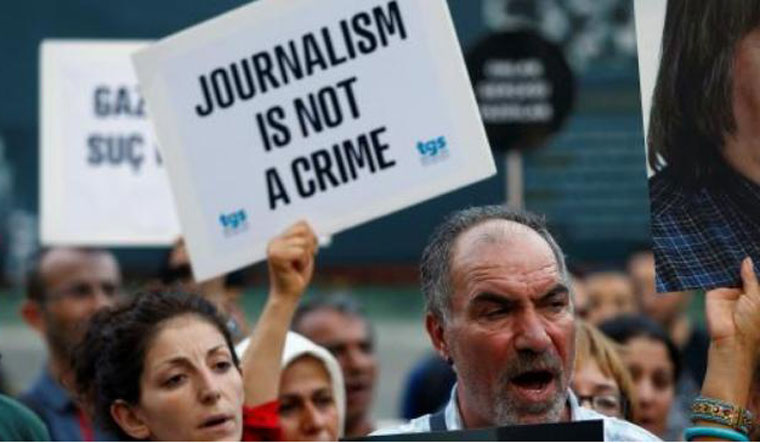Reporters without Borders (Reporters Sans FRONTIÈRES, RSF) has unveiled a list of the 20 worst Digital Predators to Press Freedom and what it terms ‘Modi’s Yoddhas’ find a place on the list. The chosen method of harassment is social media insults, calls for rape and death threats. It describes these warriors as “the trolls who either volunteer their services or are paid employees of the ruling Hindu nationalist Bharatiya Janata Party (BJP).”
The list is a compilation of companies and government agencies that use digital technology to spy and harass journalists thereby jeopardizing the public’s ability to get news and information.
This list does not claim to be exhaustive but reiterates that in 2020 “these 20 Digital Predators of Press Freedom' represent a clear danger for freedom of opinion and expression, which is guaranteed by Article 19 of the Universal Declaration of Human Rights”.
On March 11, the World Day Against Cyber-Censorship, the RSF, for the first time published a list of digital entities whose activities are tantamount to preying on journalism.
The 2020 list of 20 leading digital predators is divided into four categories according to the nature of their activities: harassment, state censorship, disinformation or spying and surveillance. Whether state offshoots, private-sector companies or informal entities, they reflect a reality of power at the end of the 21st century’s second decade, in which investigative reporters and other journalists who cause displeasure risk being the targets of predatory activity by often hidden actors.
The report reads: “Some digital predators operate in despotic countries whose leaders have already been included in RSF’s list of Press Freedom Predators. Other digital predators are private-sector companies specializing in targeted cyber-espionage that are based in western countries such as the United States, the United Kingdom, Germany and Israel”.
It futher states, “The power of these enemies of press freedom takes many forms. They locate, identify, and spy on journalists who annoy people in positions of power and authority. They intimidate them by orchestrating online harassment. They reduce them to silence by censoring them in different ways. They even try to destabilize democratic countries by deliberately disseminating false information’.
'Modi’s Yoddhas' find company with ‘The Kremlim’s troll army’, ‘Mexican Troll gangs’, ‘Cyberspace Administration of China’, ‘Egyptian Supreme Council for Media Regulation', Philippines' ‘Call Centre Hubs’ and Sudan’s ‘Cyber Jihadist Unit’.
The methods these predators follow include spreading false information and fake messages, blocking news sites and messaging apps, Internet censorship and supervision of private-sector platforms such as Baidu, WeChat, Weibo and TikTok; blocking and deleting content and apps, online selective access and control, blocking news websites, platforms and apps such as Telegram, Signal, WhatsApp, Facebook and Twitter and social media campaigns of insults and threats; and surveillance and intrusion software used to get access to apps and personal data on smartphones, including chats, photos and GPS data.
'Modi’s Yoddhas' can draw solace from the fact that they rank below Kremlin, Algeria, Mexico, Russia, Venezuela, China, Iran, Egypt, Vietnam, Saudia Arabia and Sudan among other countries in the muzzling of journalists.
The Indian Ministry of Home Affairs also finds a place in the list. Its chosen method of use is disconnect of the Internet. The report notes, “It completely disconnected fixed-line and mobile Internet communication in the northern state of Jammu and Kashmir on 5 August 2019 – an extreme measure preventing Kashmiri journalists from working freely and depriving all of the state’s citizens of access to independently reported news and information. After six months, the government partially restored broadband connections but access to many sites remains largely uncertain. India is the country that most uses Internet shutdowns – a total of 121 in 2019”.
Releasing the report, RSF secretary-general Christophe Deloire said, “The authoritarian strongmen behind predatory activity against press freedom are extending their tentacles into the digital world with the help of armies of accomplices, subordinates and henchmen who are organized and determined digital predators. We have decided to publish this list of 20 digital predators in order not only to expose another aspect of press freedom violations but also to draw attention to the fact that these accomplices sometimes act from or within democratic countries. Opposition to despotic regimes also means ensuring that the weapons for suppressing journalism are not delivered to them from abroad.”



